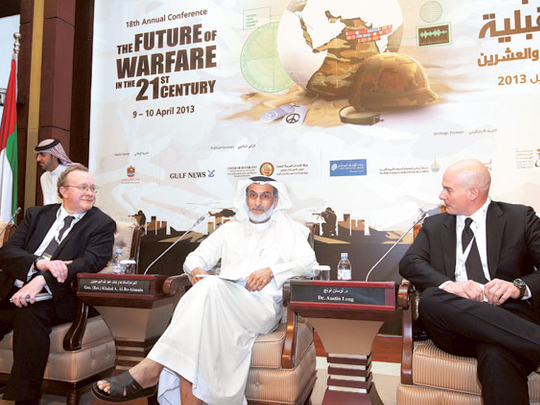
ABu Dhabi: Cyberwarfare and the rapid development and dissemination of cyber weapons threatens to far outstrip international efforts to secure cyberspace as a domain for all, a regional security conference heard yesterday.
“These cyber weapons are all too often used without regard to international law and international norms. There is a real risk that unrestricted offensive cyber operations will poison and corrode wider international relations,” John Basset, Associate Fellow, Cyber Security, Royal United Services Institute, UK told the 18th annual conference of the Emirates Centre for Strategic Studies and Research themed “The Future of Warfare in the 21st Century”.
The remarks came on the heels of massive cyber attacks against Israel, reportedly launched on Sunday by the famous hacktivist group Anonymous — the second such wave of attacks on Israeli servers,in response to what the group calls the “Israeli mistreatment of the Palestinians.
The first attack by Anonymous came in November 2012, following the Israeli attacks against Gaza in “Operation Pillar Defence.”
Last year saw more offensive cyvber operations than ever before.
Bassett said the way in which cyber-warfare is employed can range from sophisticated operations such as the Stuxnet programme allegedly used by the US and Israel to disrupt the Iranian nuclear programme, to the common kinds of hacking techniques employed by individual users of the internet.
“Securing information technologies from cyber-attack requires a range of measures to ensure that operations systems are secure, that equipment is not vulnerable to hacking from external sources, and that emergency responses to protect systems from attack are effective and easily activated,” Bassett said.
He argued guaranteeing cyber-security requires a holistic approach base on the cooperation of all concerned public and private agencies. “There are several reasons why governments would want to establish effective international norms for cyber-security: to promote a rules-based approach to global problem-solving; to ensure that international norms are representative, balanced and effective and to enhance operational effectiveness, for example by sharing situational awareness information to improve network defence. “
Bassett said cyber-warfare and the development of related weapons might provide opportunities for agreement in the areas of arms control and shared operational effectiveness.
“At present, the attacker has the edge in cyber-warfare. This is not because the attacker has a technological advantage; it is rather that the defenders do not have their defences properly organised.”
Bassett sees that potential areas for co-operation may include: information-sharing to gain improved situational awareness for network defence — for example within an alliance; evolution of a joint approach to concepts and doctrine; and better crisis management capability and resilience arrangements across security and regional alliances. Defeating the threat of cyber-attack in the future will require both a full understanding of the technologies involved and an understanding of how human nature affects the ways in which individuals seek to use technology and exploit the weaknesses of others.












